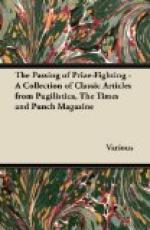But these moods pass. You will admit, though, that Peter has his lure. I read about him in the Tavistock Gazette, one of the few papers, I fancy, which does not belong to Lord NORTHCLIFFE; and this is how the lyric (it is really a lyric, although it masquerades as an advertisement) runs, not only in the paper but in my head: “To be let, by Tender” (this is not an oath but some odd legal or commercial term) “as and from Lady Day all that nice little PASTURE FARM known as HIGHER CHURCH FARM, situate in the village of Peter Tavy.” Now what could be more unlike London under the German invasion and all that nasty little tunnel known as Lower Robert Street, than Peter Tavy?
But I must not be tempted. I must stick it out here.
* * * * *
LITERARY GOSSIP A LA MODE.
The mystification practised by authors who have passed off as their own work the compositions of others is familiar to all literary students. SHAKSPEARE’S assumption of borrowed plumes is of course the classic example. But another and more subtle problem is the interchange of functions between two men of letters; and the theory recently advanced by the distinguished critic and occultist, Mr. Pullar Leggatt, deserves at least a respectful hearing.
* * * * *
Briefly stated, it is that during his hermit existence at Putney the late Mr. SWINBURNE effected an interchange of this sort with Sir W. ROBERTSON NICOLL; the Editor of The British Weekly devoting himself to the composition of poems, while the poet assumed editorial control of the famous newspaper. If the theory thus crudely stated sounds somewhat fantastic the arguments on which it is based are extraordinarily plausible if not convincing.
* * * * *
To begin with, experts in anagrams will not fail to notice that the names ALGERNON SWINBURNE and W. ROBERTSON NICOLL contain practically the same number of letters—absolutely the same if SWINBURNE is spelt without an “e”—and that the forenames of both end in “-on,” as does also the concluding syllable of WATTS-DUNTON. The fact that the Editor of The British Weekly has never published any poems over his own name only tends to confirm the theory, as the argument conclusively establishes.
* * * * *
For it is impossible to believe that so versatile a polymath should not at some time or other have courted the Muse, and if so, under what name could he have had a stronger motive for publishing his poems than that of SWINBURNE? So austere a theologian would naturally shrink from revealing his excursions into the realms of poesy, and under this disguise he was safe from detection. Lastly, while Sir W. ROBERTSON NICOLL has always championed the Kailyard School, SWINBURNE lived at The Pines. The connection is obvious; as thus: Kail, sea-kale, sea-coal, coke, coker-nut, walnut, dessert, pine-apple, pine.




